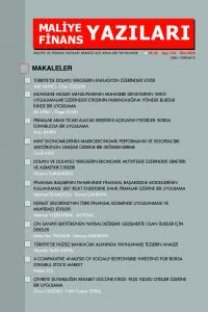Küresel Finansal Yaptırımlar: Oyun Teorisi Yaklaşımı İle Ampirik Bir Uygulama
Bu
çalışmada, herhangi bir devletin veya bir devletler grubunun taleplerini başka
bir devlete veya devletler grubuna, herhangi bir askeri güç kullanımı
olmaksızın uygulayabileceği finansal yaptırımların bir “oyun teorisi” sistematiği çerçevesinde incelenebileceği
ortaya koyulmaya çalışılmıştır. Finansal yaptırım uygulayan ülke ve hedef
ülkenin geliştirdikleri stratejiler ile denge sağlanacak bir strateji
bileşiminin olabileceği belirlenmiştir. Çalışmada incelenen örnek olayda; ABD
ve AB için dört, Rusya için üç strateji belirlenerek 4X3’lük bir kazanç
matrisi oluşturulmuş ve analitik bir model önerisinde bulunarak bir
değerlendirme yapılmıştır.
Anahtar Kelimeler:
Finansal Yaptırım, Oyun Teorisi, Nash Dengesi, Vaka Çalışması
Game Theory
In
this study, it has been aimed to reveal that financial sanctions within the
frame of a “game theory” that is used by
any state or a group of states for the realization of its demand from another
state or a group of states without using any military forces can be analyzed. It
has been specified that there could be a combination of strategy that creates
an equilibrium with the strategies developed by the country applying financial
sanctions and the target country. In the case study analyzed, a 4X3 winning matrix
that reflects three strategies for Russia and four strategies for USA and EU is
created in addition to make an evaluation for proposed analytical model.
Keywords:
Financial Sanctions, Game Theory, Nash Equilibrium, Case Study,
___
- (1) Akkutay. B.L. 2014. Birleşmiş Milletler Andlaşması Çerçevesinde Ekonomik Yaptırımların Hukuki Niteliği ve Yargısal Denetimi: TBB Dergisi, 413-446
- (2) Allen. S.H. 2005. The Determinants of Economic Sanctions Success and Failure: International Interactions, 31,117-138.
- (3) Cortright. D., Lopez.G. 2000. The Sanctions Decade: Assessing UN Strategies in the 1990s, Boulder, CO: Lynne Rienner Publishers.
- (4) Drezner, D. 2000. Bargaining, Enforcement, and Multilateral Sanctions: When Is Cooperation Counterproductive?” International Organization, Vol. 54, No. 1, 73–102.
- (5) Eaton. J., and Engers.M. 1999. Sanctions: Some Simple Analytics. American Economiv Review Papers, 409-414.
- (6) Hafbauer. G., Schoot. J., and Elliot. K. 1990. Economic Sanctions Revisited: Instute for International Economics.
- (7) Kaempfer. W.H., and Lowenberg. A.D. 2007. The Political Economy of Economic Sanctions:Handbook Of Defence Economics. Vol. 2, 868-911.
- (8) Knoor.K. 1975. The Power of Nations: The Political Economy of International Relations. New York: Basic Books.
- (9) Smith. A. 1995.The Successand Use of Economic Sanctions: International Interactions, 21,229-245.
- (10) Yılmaz. E. 2012. Oyun Teorisi. 2.Basım, 2012, Literatür Yayıncılık.
- (11) http://www.abhaber.com/ab-ve-abdden-rusyaya-yeni-yaptirimlar/ Erişim Tarihi:27.06.2014.
- (12) http://www.bbc.co.uk/turkce/haberler/2014/04/140427_ukrayna_ab_toplaniyor.shtml, Erişim Tarihi:27.06.2014.
- (13) http://www.abhaber.com/rusyaya-yaptirimlar-ne-kadar-etkili/, Erişim Tarihi:27.06.2014.
- (14) http://gazetem.ru/haber/abd-rusyaya-uygulanan-yaptirimlar-cok-etkili/21153/,Erişim Tarihi:27.06.2014).
- (15) http://yenisafak.com.tr/ekonomi-haber/soguk-savasta-finansal-atak-07.05.2014-642908, Erişim Tarihi: 27.06.14.
- (16) http://www.dunya.com/rusyaya-ciddi-ekonomik-yaptirim-olasiligi-yok-221120h.htm, Erişim Tarihi:27.06.2014.
- (17) http://www.dunya.com/rusyaya-ciddi-ekonomik-yaptirim-olasiligi-yok-221120h.htm, Erişim Tarihi:27.06.2014.
- ISSN: 1308-6014
- Yayın Aralığı: Yılda 2 Sayı
- Başlangıç: 2008
- Yayıncı: Maliye ve Finans Yazıları Yayıncılık Ltd. Şti.
Sayıdaki Diğer Makaleler
Bekir Kaya, Emine Öner Kaya, Kürşat Yalçıner
Borsa İstanbul’da Gün İçi Verisinin Analizi
Türk Bankacılık Sektöründe Finansal İstikrar-Rekabet İlişkisi
Finansal Kaldıraç Derecesi Ve Seçilmiş Sektörlere Yönelik Bir Uygulama
Finansal Tablo İlanlarının Hisse Getirileri Üzerindeki Etkisi: BİST’de Ampirik Bir Uygulama
İbrahim Bozkurt, Sezer Öksüz, Rıfat Karakuş
Bireysel Emeklilik Fon Tercihlerini Etkileyen Unsurlar Üzerine Bir Çalışma
Selim Aren, Sibel Dinç Aydemir, Arzu Rahime Uçar
Banka Performanslarının Ölçümünde Risk Bazlı Uzaklık Yönlü Fonksiyon Yaklaşımı
Küresel Finansal Yaptırımlar: Oyun Teorisi Yaklaşımı İle Ampirik Bir Uygulama
